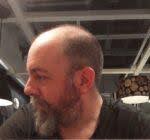TRANSLATED FROM THE TURKISH BY NEIL P. DOHERTY
Five O’Clock
In Istanbul I raised up my hand
I was a little drunk, a little in love, a little like a minaret,
I stopped all the passers-by
Look, I said, look how the sky hasn’t grown old
And those seagulls, I said, look at how petulant they are
On the finest minaret in Istanbul
I had five eyes of blue.
In Istanbul I put out one of my eyes
Half the fish, they disappeared, they left
Not a fish tail remained, I went blind
There was a time when I’d see women with their fans
In their homes, with their husbands, in their sleep
Half made up of hair, half of lip
And I’d think of how warm they’d be.
In Istanbul on the Divanyolu there by the sea
I’d gathered up everyone around me
And all spoke what was on their mind
A woman fell silent while babbling on
I sidled up to her and held her hand
Look, I said, how petulant the seagulls are
Just then the clocks stuck five.
The 8.10 Ferry
Do you know what is in your voice
the middle of a garden
a blue silk winter flower
you are going upstairs
to smoke a cigarette
Do you know what is in your voice
there is sleepless turkish
you are not happy in your job
and do not like this city
a man folds away his newspaper
Do you know what is in your voice
there are old kisses
the frosted glass of the bathroom
you didn’t appear for a few days
there are school songs
Do you know what is in your voice
the untidiness of a house
you keep raising your hands
to fix the loneliness the wind sweeps
round your head
You know what is in your voice
words you could not say
perhaps just small things
but at this hour of the day
they stand like monuments
You know what is in your voice
words you could not say
From 20 Poems
The Pheasant’s Face
The pheasant’s face is an atmospheric phenomenon
This I learnt from the hunter, the writer of the random
In turn the wild ducks on the water beat their wings
Just to stop it from freezing over.
So here, with its floating quay, is your Beşiktaş
Pegging a convoluted century back into the sea;
Lord, was it in the days of your childhood
That you created this long Anatolia?
The lady screenwriter and I are sitting on a bench
Would that it were only for this that I loved you
Two Hearts
The shortest path between two hearts:
Two arms stretched out to each other
Touching from time to time with only the
Finger tips
I’m running over to the stairs,
Waiting is just time’s show of force;
I’ve arrived too early and can’t find you,
It’s though something is being rehearsed.
Birds have flocked together, ready to migrate
Would that it were only for this that I loved you
As A Computer
A lake utilized as a computer
Bearing pragmas to the Seljuks, Al-Ghazali
Counting the first stupidity as a knot
Denied the four directions and always looked up,
As soon as the mirror in front of him cracks
Assume the mystic adept has taken his own life
Again, that is why the Ottoman star
Began to fall the very instant it was born,
I looked to see footprints gathering up the ground
Would that it were only for this that I loved you
Afyon Station
Remember the little girl in Afyon train station, you know,
The one who took off her shoes getting on the train;
Think back to the Varto earthquake: a box of milk powder
And a bra sent as aid from the West.
The man painted his walls with the milk powder
His wife, she hid away the bra not knowing what it was
Thinking to use it as earmuffs come the winter.
Lord, was it really in the days of your childhood that…?
Scores of people sitting round doorways
Would that it were only for this that I loved you
Also, Read Solitary Atlas and Other Poems by Şükrü Erbaş, Translated from The Tukish by Neil P. Doherty and Gökçenur Ç. Published in The Antonym:
Follow The Antonym’s Facebook page and Instagram account for more content and exciting updates.




























0 Comments